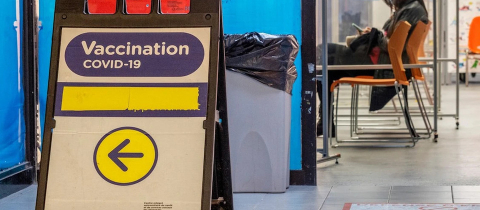This article was first published in The Montreal Gazette.
The best way to prevent the spread of COVID-19 is to keep your distance from others, limit your social interactions, wear a mask and wash your hands frequently. Up until now, no one as suggested that we should start wearing protective eye goggles, though a new study in JAMA Ophthalmology argues that maybe we should be.
This coronavirus can only infect you if it gets into your respiratory system first. You must essentially breathe in the infected droplets that someone close to you expels when they sneeze/cough/breathe in your general direction. Or you must touch an infected surface and then bring your hands to your face, mouth, nose or eyes and introduce it into your system that way. How much the second method of infection contributes to viral spread is still somewhat unclear, though there is very little downside to playing it safe and washing your hands more often than you previously did.
However, while we all now wear masks to cover our mouth and nose, we do not similarly cover our eyes. Admittedly, the point of masks is more to prevent you from infecting others, not so much to prevent others from infecting you.
New research has led some to argue that this should change. Researchers in China analyzed 276 patients hospitalized with COVID-19 and found that 5.8 percent wore eyeglasses daily, compared to the general population, where 31.5 percent wore eyeglasses daily. Researchers concluded that people who wore eyeglasses daily were less likely to be admitted to hospital with COVID-19. Therefore, they reason, wearing eyeglasses might offer some protection against infection.
The idea has some plausibility. In hospitals, all staff must now wear eye protection when interacting with patients. It is unclear how much of a risk infection through the eye truly is, but hospitals are particularly high-risk environments where you are often at close quarters with sick patients. The general consensus is that it is better to be safe than sorry.
For the general public, however, the benefit of eye protection (either with face shield or protective goggles) is more uncertain. A meta-analysis published in The Lancet in June of this year did find that eye protection was beneficial and reduced the risk of infection by around 10 percent. However, almost all the data came from health care settings and was based on observational, not randomized, studies.
The current study in JAMA Ophthalmology suggests that simple eyeglasses offer up at least some protection to the general public. However, it should be pointed out that regular glasses do not fully cover the eye and would almost certainly be inferior to proper protective goggles. And the study itself has some caveats. First, researchers estimated that 31.5 percent of the general population wore glasses, but this was based on a 1987 study from a different part of China and the actual number may be quite different. Second, the paper only looked at people admitted to hospital, not at total infections, and so infected persons who stayed home were not counted. Finally, in a small study like this, it is entirely possible that the low percentage of hospitalized COVID patients that wore glasses was due to something entirely different. Perhaps in this sample eyeglass wearers were less likely to attend large gatherings and therefore less likely to get sick.
For people looking for definitive proof that face shields, goggles or even glasses protect against COVID-19 infection in the general population, then this study is far from definitive. They might offer some protection if someone coughed directly into your face, but you probably shouldn’t be getting that close to people in any case. As before, the best advice is to keep your distance. And wear your mask. And wash your hands.







